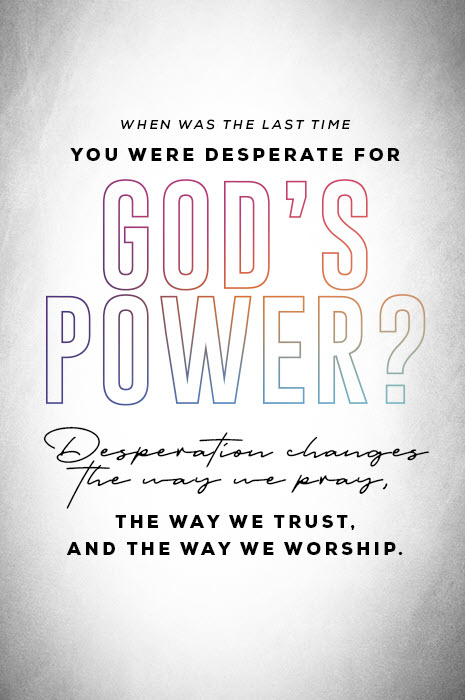
Fear almost kept me from enjoying a future with my wife, Dani. When we first started hanging out as friends, I felt intimidated by her. She was an attorney while I had just graduated from college. She was 5’11. Me? 5’9″ (with heels, she elevated to 6’4″ while I remained at her armpit level!) She made more money than me, several times over. She asked me harder questions and challenged me more than anyone I’d ever dated.
In this season, a mentor and I had a conversation that changed my life. I told this man how I knew I was going to have to grow up and relate to her in a way in which I had never related to a woman before. His response created a defining moment. He said, “It sounds like you have a choice to make - you can run from her or to her.” Dani and I celebrated eleven years of marriage this past summer, so the choice I made is pretty obvious now. But, back then, the future wasn’t so clear, and I was afraid.
For many of us, fear becomes a shaping force in our lives. It certainly had a significant impact on the people whose stories we read about in Scripture. Let's consider the experiences Joshua, Gideon, and Mary had with fear and what they learned"
Fear turns our focus in the wrong direction.
In Numbers 13-14, we read about the twelve spies who explored the Promised Land. They returned with two very different reports. One report, delivered by ten of the spies, was negative. And another report, from Joshua and Caleb, was positive. The ten spies allowed fear to defeat them because they focused on the size of their opposition, while Joshua and Caleb overcame their fear because they chose to focus on the character of God. All twelve spies shared the same journey into the Promised Land, but they decided to focus on different aspects of that experience and tell different stories about it. The ten spies listened to fear, and their choice had terrible consequences – those ten and an entire generation died in the wilderness. They never saw the Promised Land.
Joshua and Caleb led for decades to come!
Fear roots our identity in the wrong location.
In Judges 6-7, we meet a man named Gideon, who is threshing wheat in a winepress. Gideon was hiding from the Midianites and other tribes of marauders who were terrorizing his people. In his fear-driven state, he had a hard time recognizing a messenger from God, who called him to lead the people to defeat their enemies. An angel found Gideon in that threshing floor, greeting him by saying “The Lord is with you, mighty warrior.”
Gideon didn’t get the greeting; God seemed distant in light of their distress, and Gideon saw himself as weak (from the weakest clan in his tribe and the youngest in his family). Despite his initial failure to see himself as God did, God used Gideon to deliver the people in a miraculous way.
Three-hundred Hebrew warriors defeated tens of thousands of men in the Midianite army.
Fear only considers what is humanly possible.
In Luke 1, Mary experiences the craziest wedding-planning story. The angel Gabriel informed her that she would become pregnant through the Holy Spirit and conceive a child, the Messiah! Confused and afraid, Mary couldn’t believe that God would bring the Messiah through her. She was afraid because she was only considering what was humanly possible, while God wanted to show her how nothing was impossible with God.
In the end, Mary chose to respond with faith and courage, playing a powerful role in the story of salvation for not only the Jews but the entire world.
So, if fear can defeat us in these ways, how do we defeat fear? How do we win the battles we’re accustomed to losing?
1. Recognize defeating fear is spiritual warfare.
We aren’t playing around here. In Ephesians 6:10-18, Paul challenges believers to prepare for spiritual warfare. In verse 11, he writes, “ Put on all of God’s armor so that you will be able to stand firm against all strategies of the devil.” Our enemy’s schemes include: shifting our focus in the wrong direction, rooting our identity in the wrong location, and ensuring we only consider what is humanly possible.
In a teaching on Ephesians 6, Priscilla Shirer says, “If he’s scheming against you, you ought to have a scheme against him.” If we’re going to defeat fear, it won’t be through our willpower, but through fully tapping into our spiritual resources!
2. Replace striving in our power to depending on God’s power.
In Psalm 46:10, we learn that true strength is found in surrender, not striving. If you want to experience God like Joshua, Gideon, and Mary did, then all you have to do is unclench your fists. God’s power and presence are on the other side of our surrender.
3. Risk embarrassment because of our desperation for God’s power
In 1 King 18, Elijah models desperation for God to show up on Mount Carmel amidst an epic showdown with the prophets of Baal. If fire didn’t fall from heaven, how would Elijah have felt? What would Baal’s worshippers have said? When was the last time you were desperate for God’s power? Desperation changes the way we pray, the way we trust, and the way we worship.

That’s the message behind the song “Surrounded (Fight My Battles)” by Upperroom. The repeated line "This is how I fight my battles” may seem simple, but, in all actuality, it’s profound. We fight spiritual battles when we stop worrying about what people think and instead look to God with thanks, praise, and abandon. The lyrics, “It may look like I’m surrounded, but I’m surrounded by You,” were inspired by Elijah asking the Lord in 2 Kings 16-17 to open his servant’s eyes so he could see that “those who are with us are more than those who are with them.”
Similarly, don’t forget the words of 1 John 4:4, “The Spirit who lives in you is greater than the spirit who lives in the world.” The battle may seem scary, but we know who wins! We can overcome fear because He has overcome death and the grave, and He is in us.
Scott Savage is a pastor and a writer. He leads Cornerstone Church in Prescott, Arizona. Scott is married to Dani and they are the parents of three “little savages.” He is the creator of the Free to Forgive course and you can read more of his writing at scottsavagelive.com.






